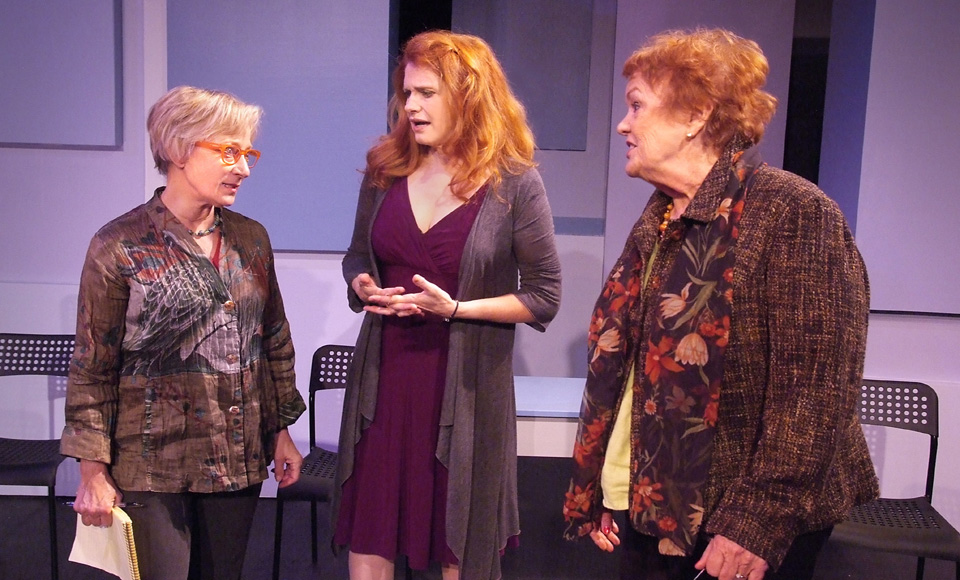
LOS ANGELES — I remember seasoned Yiddish actress Chayele Ash once relating a favorite saying: “Theatre is Life!” she said, “Film is Art! Television is Furniture!”
Thousands of actors in L.A. may have come here to pursue fame and fortune in Hollywood, or on TV, but until that big break comes there’s a thriving small theatre scene that employs Actors’ Equity Association — that is, unionized — actors, as well as many others who are still honing their craft and seeking to earn their union card.
Scores (maybe as many as 150) of under-99-seat venues feature these actors in roles small and large. There they can keep working and refining their skills, keep being seen by the public, and maybe catch the eye of an agent, manager, or casting director. A few will make it big someday; others are content to keep doing what they love, and work a day job to pay the rent.
These small theatres generally stage a play for at most six weekends, with five performances a week. Their annual budgets range from $90,000 to $350,000. Most of their support comes from private donors and some limited city or community funding. But they barely keep the spotlights on while they scrape up the rent.
Conditional on the size of their budgets and other variables, in most cases these companies cannot afford to pay their actors union wages, indeed not even minimum wage for performances. There’s no pay at all for rehearsal time. With this understanding, by the terms set by a 99-seat waiver plan worked out with Actors’ Equity back in the 1970s, union actors were allowed to appear as “volunteers,” or in some cases as co-producers if the ensemble was a group-owned collective actors’ enterprise. In some theatres actors made as little as $7 per performance.
Theatre at the crossroads
Now their theatrical life stands at a crossroads. As of December 15, according to a new ruling by Actors’ Equity last April, union actors must be paid minimum wage. In California that is now $9 an hour, but only for two more weeks: As of January 1, it will be $10.50 an hour.
If the theatres are now required to suddenly and drastically increase actor compensation, where will those funds come from? What will keep them from closing their doors? Equity members would now be prohibited from donating their talents to small, nonprofit theatres. Some actors are already claiming they will defy their union either openly or by appearing under another name.
Actors are caught in a kind of never-never land. Is working for free like being a scab, or like being an intern, or just being naïve? Is the producer running away with mega-profits that rightfully belong to the actors and crew? Is this the theatre world’s version of the Huffington Post story, where experienced, professional writers were recruited to help build a viable news site that would get their progressive views out to the world, but in the process further enriched its owner? It’s the old, and often exploitative “exposure” argument.
Or perhaps it’s more how actor Noah Wyle, who also serves as artistic producer of Hollywood’s Blank Theatre Company, idealistically puts it. “Call it ‘love of the craft,’ esprit de corps or old-fashioned apprenticeship,” he says, “we’ve survived because of a consensus of understanding: We are here to make theater, not money; that’s what TV and movies are for. Intimate theaters show we value you, the actor, by inviting you to create something new with us. You’re compensated by having a place to nurture your talent, showcase your abilities, satisfy your creativity and play roles the commercial entertainment machine would never let you play.”
What is motivating Equity’s push for minimum wage in L.A. at this point? Is it only in response to complaints about low pay from some actors? The waiver system used to be in effect in other theatre towns such as New York, Chicago, and San Francisco, but years ago Equity phased it out, standardizing in its place a “showcase” code for under 50-seat houses. In this situation, for fewer performances, a writer could try out a new work before an audience, intended for further revision after its initial reception, or which for topical or timely reasons was never likely to clear a profit.
Union members vote
In response to the April Equity ruling, the Los Angeles County membership voted on the union’s proposal. Over 3000 votes were cast, and a landslide margin of almost 2 to 1 (2,046 to 1,075) rejected the new system. The “no” camp adopted the slogan “We want change, just not this change.”
Los Angeles Equity members grasped that L.A. is not New York, with its huge Broadway market. The few huge commercial theatres in L.A., such as the Pantages or the Ahmanson, recruit actors nationwide, often in touring shows, and do little for in-town actors. What other opportunities exist for theatre actors here?
Equity’s Executive Director Mary McColl regarded this referendum as merely “advisory,” and announced that the original plan, with small modifications, would go into effect anyway. A statement released after the vote said: “Actors’ Equity Association (Equity) is the labor union which represents more than 50,000 professional stage actors and stage managers nationwide. Equity negotiates wages, working and safety conditions, and provides a wide range of benefits including health, pension and 401k plans for its members.”
McColl added that Equity’s governing body, the National Council, made some adjustments and exemptions to the original proposal pursuant to the referendum, also stating that self-producer membership companies and showcase productions would continue as before.
Noah Wyle of the Blank Theatre Company is unimpressed. “As a proud member of Equity,” he wrote in Variety, “I understand the issue and applaud the intention, however misguided. As a small theater producer, however, I am extremely frustrated….
“We are not anti-union, nor are we anti-minimum wage, but Equity’s failure to converse with us and/or articulate the complexity of the issue to its members has forced us to engage in a media campaign to give full context to the debate.”
In response to the threat of a lawsuit, in October 2015 Equity stated: “It is disappointing that this prolonged process has now resulted in what will surely be a very expensive litigation for Actors’ Equity. Unfortunately, the real victims here are the members all over the country who understand that when a single community files costly lawsuits and buys full-page ads in major newspapers to insist that they should not be paid, it has an inevitable and deleterious effect on the union’s bargaining power for the rest of its members.”
The pro-99-seat theatre community filed a lawsuit bearing the lead name of actor Ed Asner as plaintiff against the Equity plan. On Dec. 8, United States District Court Judge Terry Hatter dismissed the case. But the plaintiffs have vowed “to continue our fight to preserve this important and valuable part of our City’s cultural life.” A possible appeal to the federal appeals court is one option being considered.
Judge Hatter’s decision may be found here.
“The dismissal of this lawsuit, which we had always viewed as a frivolous and costly legal matter, is a victory for our union,” said Equity’s Mary McColl. “Not everyone in our union agreed with changes in policy that our council put in place in April of 2015. We understand those opposing views, however many of our members needed more than the nominal performance stipends, which had been the longtime practice. These are not unpaid internships — this is work.”
What happens now?
Gary Grossman, an actor, producer at the Skylight Theatre Company and a plaintiff, spoke with People’s World. “There are all kinds of plans out there,” he said, “but Equity only wants to see one plan, but not all 99-seat theatres will fit that plan. Ideally, Equity would like to close 99-seats forever, and just leave the showcase code, to divide and conquer one group of theatre and actors against another. There are viable alternative plans that the actors themselves came up with, and the producers came up with.”
The pro-99 group has created a Petition in support of a new referendum, which would set two proposals side by side for a vote, the national Equity plan and a locally developed plan. The petition says in part:
“We, the undersigned, are dedicated to the survival and growth of Intimate Theatre in Los Angeles. We are actors, stage managers, playwrights, designers, directors, producers and hyphenates of all of the above. We are also audience members, neighborhood restaurants and bars, and local businesses that benefit from the thriving L.A. Intimate Theatre landscape. We are committed to preserving, protecting and promoting theatres of 99-seats or less, not only in Los Angeles but throughout the United States, while defending Actors’ Equity Association (AEA) members’ rights, privileges and protections when they perform in such venues.”
Left unspoken in the debate is the low public support for the arts in the United States compared to other advanced countries, where nationally sponsored theatre can be found in almost every sizable town. One idea possibly worth exploring, for example, would be free or low-cost rent to community theatres meeting certain minimal requirements, thus freeing up more funds to pay talent.
A lack of common purpose between a national union and a large swath of its local members is always an unfortunate development to witness. The dénouement is still unfolding. We will be watching for the next act in this drama.










